Wizards
by Ben | July 2, 2004 6:40 pm
20th Century Fox/Bakshi Productions (March 2 1977), Fox Home Entertainment (May 25 2004), single disc, 81 mins plus supplements, 1.85:1 anamorphic widescreen, Dolby Digital 2.0 Stereo, Rated PG, Retail: $14.98
Storyboard:
Set in the prodigal future time when war has all but destroyed the planet, Wizards finds the world blasted back to basics, with folklore and magic the mainstays of the beings who have survived. Head of the elves, fairies and other assorted creatures who dwell on Earth, are two aged wizards, the for-the-good Avatar, and his twisted brother Blackwolf. Rising up with a mutant army, Blackwolf doesn’t fare well against his brother’s magic, until he discovers the weapons of mass destruction from the past as well as Nazi newsreel footage, which provides him with a new angle on how to wage a war. Blackwolf trains his army in a new way and for a new war, marching against his brother. A battle of magic versus technology begins, with Avatar leading a small band from Montagar into Blackwolf’s Scortch for a final Wizards’ duel…
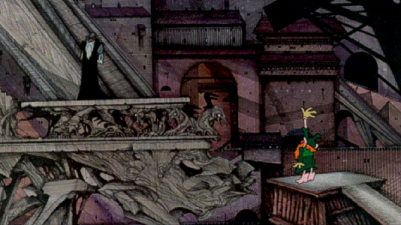
The Sweatbox Review:
Back in the early 1970s, director Ralph Bakshi was, for some reason, being heralded as the “new Walt Disney”. His adult animation film Fritz The Cat had taken the crudity of disturbed comic book artist Robert Crumb and breathed cartoon life into the story. The film must have felt “fun” and “new” after decades of cute Disney creations, due to the plentiful offerings of sex and violence all carried out by typically drawn animated animals, and was a big hit based on its modest budget.
Bakshi was the new “golden boy” of animation (much as Don Bluth would be hailed later, and even like John Lasseter is regarded today), and looked set to capitalize on his post-Fritz career. There was a sequel, which Bakshi wasn’t involved with and was even less palatable than the first, while Bakshi himself took to producing “personal” films that tried to convey his life’s influences and experiences. His early 1950s and 60s career was full of interesting choices and promise: stints on such comic book cartoons as Deputy Dawg, The Mighty Heroes, Sub-Mariner, The Mighty Thor, Hulk, Captain America and, most memorably, Spider-Man honed his abilities, though after Fritz The Cat, he concentrated exclusively on his own kind of provocative features.
Heavy Traffic, Coonskin, American Pop and, most disastrously, the first screen adaptation of The Lord Of The Rings, all proved commercial and artistic disappointments, with Bakshi’s fashion for rotoscoping his animation around live actors offering a life-like movement, but one that was staid and actually life-less. Each film seemed more erratic in nature and poorly structured than the last, and with a production time of less than a year for most, ended up being quite laborious for audiences to sit through. Bakshi would continue to churn out these films for a while until he was offered a return to television to revive the Mighty Mouse character for a new series (ironically it was at the original Mighty Mouse’s home, TerryToons, at which Bakshi had gotten his professional start).
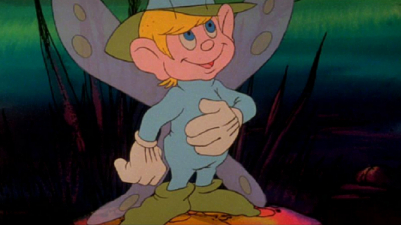
The New Adventures Of Mighty Mouse remains a highlight in an otherwise frustrating career, and it can arguably be reasoned that this was the show that ushered in today’s zippy and warped television animation writing and style. Shows such as The Powerpuff Girls, Dexter’s Lab, Invader Zim, Samurai Jack and Teacher’s Pet all hark back to when this show played on Saturday morning TV, and the similarities between these and The Ren And Stimpy Show are no coincidence: Bakshi’s Mighty Mouse collaborator was John Kricfalusi, creator of those later characters.
In the midst of Bakshi’s 1970s output came Wizards (1977), another film that pushed through a personal message (to be mindful of the dangers of technology, though by the film’s puzzled end we’ll see that technology actually trumps magic as a way to off your brother, and there’s no denying that Bakshi could have used some of today’s magic to help him out), This one came with a longer lead time of two years and laid on some sci-fi mythology to draw in larger crowds than usual (perhaps a command from 20th Century Fox, who were picking up the tab). Certainly there are touches of Bakshi’s trademarks in the film: scantily clad women and falling back on rotoscoping for the more epic scenes do belie is PG rating and (lack of) technical abilities. But it’s not as intrusive and obvious as with his Lord Of The Rings, though that’s not to say it isn’t plentiful and a distraction from the otherwise traditionally animated characters.
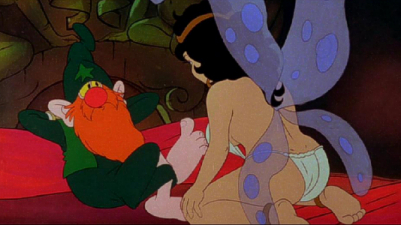
Although Bakshi’s intention was to create a film that would appeal more to kids than his previous works, Wizards itself is not entirely free of the traits in his earlier works. As mentioned above, rotoscoping takes on the task of conveying size and spectacle – something that didn’t even really stand up back then, let alone against today’s epic CGI battles. A brave stab at trying to find a mainstream audience, it seems that the subject matter may have been too great a task for the director at that point in his career, though what else he might have tried does not come to mind easily! This was perhaps the logical next step for him, but the comical, cartoony animation of Fritz The Cat wouldn’t have suited the subject (and indeed doesn’t, when a few characters turn up looking like rejects from that film). Ironically, for a film about technology, it seems he didn’t have the tools he needed to complete this film along the lines of the immense vision that must have set him on this path in the first place.
Surreal, badly timed bits of business come and go, mainly in the backgrounds when important plot points are trying to be conveyed, though paradoxically there is usually an interesting or subtle moment just around the corner, which only points out what is not up to scratch. It is certainly an odd film to watch, falling between two polar opposites: an animated movie with big ideas but not the means to see them through, and a film which sports perfectly rendered cartoon characters that feel out of place in such a large undertaking. The animation overall is nothing to shout about – even for the late 1970s – being only a notch or two up from the Filmation Studio output of around the same time. Most distracting is the disguised, not-even-rotoscoped footage, culled from various stock footage libraries and battle films (mostly Zulu, obvious from the multiple spears and shields the army holds – how did he get permission for this and do they know?). These have simply been “grunged up” to look funky and grainy, a technique as out of place here as much as it was in The Lord Of The Rings.
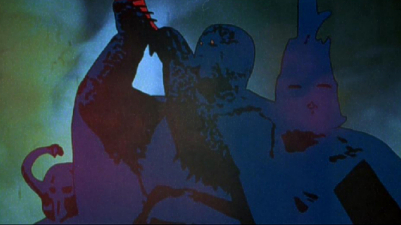
The soundtrack doesn’t help too much either, being a mix of out of place disco-jazz and now-dated electronic synth – possibly innovative in its day, but with no-where the timelessness and longevity than, say, Tron’s multi-layered electronic/orchestral blend approach still evokes. Voices are likewise fairly flat, and sound simply read off a page rather than acted and elaborated upon. Among the cast are Susan Tyrrell, uncredited as the narrator whose “mysterious” reading sounds more like boredom, and Mark Hamill, though this was just before Star Wars and the film wasn’t able to capitalise upon his inclusion, not that you’d recognise him anyway. Sound effects are a bizarre mixture of traditional toon crashes and thwacks, which often play in scenes that are otherwise serious and do nothing to provide light-hearted moments, but rather annoy when we are trying to hear exposition (and why is it, when a character has an important line to get across, that they must turn their backs away from camera?).
For a director who was always trying to break away from the Disney mould, Wizards has a surprising amount of these conventions in place. The film opens with a traditional storybook approach (albeit with a typical Bakshi spin), though these sections feel long, and are packed with too much backstory and detail. The direction is schizophrenic, with camera angles mainly composed of flat profile shots with an imaginative shot seemingly thrown in to confuse matters. It’s simply jumbled and choppy, something I was surprised at seeing that the editor was one Donald W Ernst, a long-time Bakshi collaborator who has since moved over to “the other side” to produce Disney’s Aladdin, Fantasia/2000 and Destino. Other names I recognised included Ian Miller (whose washed out, highly detailed backgrounds look odd against the simplistic character animation) and Art Vitello, more recently of such projects as the Gummi Bears, Tiny Toons Adventures, Taz Mania, The Tick, and as the original director on Titan AE, before Bluth took over, when it was known as Planet Ice.
The strange thing is with Wizards, as mentioned above, is that in all of the chaotic cutting between techniques, the film tries to tell an interesting story, and has more than several inspired ideas buried among its sub-Tolkien plot. That the plot may feel stale to some is probably more down to the fact that the world is currently “all Tolkien-ed out”, and that post-apocalyptic movies are a dime a dozen, though there is no denying that Bakshi made some positive choices in coming up with artistic solutions to the lack of money and time he had to finish the film. It’s just most of the other choices that seem more than a little odd now: touches like Avatar’s cigar (which soon simply disappears) and the way he is played as some bumbling stoner, more dippy than even Michael Gambon’s Dumbledore, and sounding like a drunk mix of Peter Falk (apparently intentional) and George Burns.
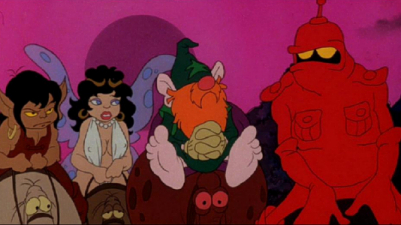
An obvious attempt to aim for a wider audience, this is probably the closest Bakshi ever got during his most prolific period (discounting the Paramount-funded live-action mix Cool World) to attracting children. That Wizards came out the week before a certain other sci-fi fantasy, Star Wars, also says as much as probably needs to be said as to why it failed at the box office. The fact that Star Wars was such a big hit might seemed to have helped such a film that could have picked up the overspill from theaters showing Lucas’ epic, but quite the opposite happened: Fox, who distributed both films, pulled Wizards from screens to make room for more Star Wars prints! Following the experience, Bakshi would try again with Lord Of The Rings, ultimately bringing it all together for the epic Fire And Ice.
Despite its shortcomings, it’s Wizards, and Fire And Ice, for which Bakshi seems most remembered (but he’s also as infamously remembered for Fritz and Rings too). Their “far off land” settings certainly help place them more in the animated world than his laborious “real world” features, and their lower theatrical ratings meant that more teenagers were able to see them originally, thus leading to cult status today. The director’s work has been a little sporadic recently, and that his last big screen outing was the chaotic Roger Rabbit wannabe Cool World speaks volumes about the fact that he seems to have lost his independent voice in this day and age of computer-animated family comedies. As a reminder of the kind of work he could achieve on a fairly good day, however, Wizards is an “interesting” view now, and even though we all know what a terrible idea it would be, Bakshi’s proposed Wizards II would be an awfully remarkable thing to see him pull off in this day and age.
Is This Thing Loaded?
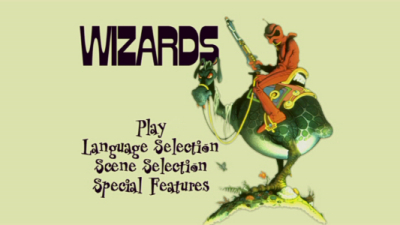
Apart from decent audio and video, the disc also surprises in a number of additional extras that make nice bonuses and help place the film somewhat in context. Obviously the most favorite of his own films, Bakshi himself is on hand to offer his thoughts during a full-length Audio Commentary. By turns interesting and yawn-inducing (much like the film!), there are some tidbits of information to be gleaned in here, such as the reasons behind many of the artistic choices and a little info on the crew, but mainly this is a rambling track, where the director merely repeats himself, makes confusing digs at Disney, and praises the work in the film out of all proportion (he may have had great people working for him and it may have been a blast working at Bakshi Productions, but sitting here watching the film 27 years later proves it’s not the pinnacle of anyone’s career).
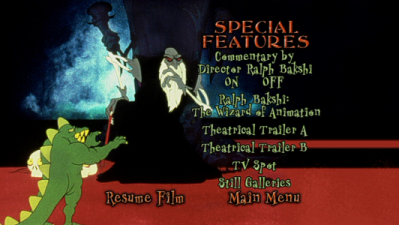
Next up is the meaty bonus, a 30-minute interview with the director, labelled Ralph Bakshi: The Wizard Of Animation. I can’t say I’ve really seen enough of Bakshi’s stuff to really rate him either way (I find him frustrating in the way that he obviously has ideas, but seems locked to just one way of filtering them), but to hear the man riff on subjects as the Disney Studios when his own output has been less than exemplary did rankle me a little. Long time fans of the Mouse House will not find themselves endeared to Mr Bakshi any more than they may be now, though fair play to Fox and to the director for being so candid and for not cutting such remarks out (however confused – and confusing – they may be). But he’s quite a character, and is still sprightly for a guy who must be in his 70s now.
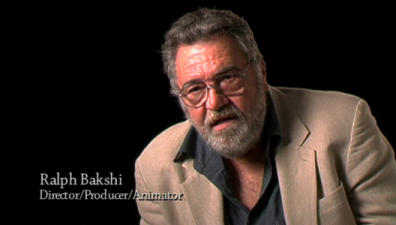
The half hour almost plays as supplemental material for all of Bakshi’s films on DVD, covering his career from TerryToons to The Lord Of The Rings, and though he makes it plain that you’ll not see or hear him on any of his other features, he was tempted to return to provide comments for the later Fire And Ice special edition. In this featurette however, Bakshi repeats much of what is said in the commentary, feeling the need to validate why he was making a kids film. Apparently he wanted to get away from the profanity of his earlier, adult films, though this doesn’t explain the questionable content in the film for younger kids: Princess Eleanor shows off a considerable amount of her body and is at one point named a “slut”, and Avatar’s call of “son of a b****” describes his brother (and therefore his own mother?) in the final scenes. Mind you, Bakshi’s own language slips one or two f-words into the interview itself, so fair warning if you’re watching this with small children in the room. Admirably, the documentary is presented, as with all of this disc, in 16×9 anamorphic widescreen.
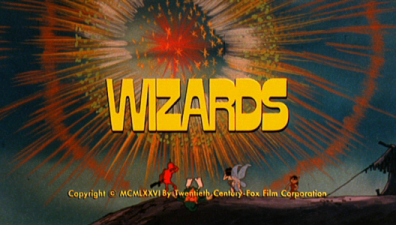
In addition, you’ll find two Theatrical Trailers and a TV Spot rounding out the video based clips (again in 16×9). Predictably dated, these trails don’t do a lot to get one excited for the film, but having said that, neither does the original Star Wars teaser in retrospect. Surprisingly, they pack in a number of shots that don’t do the film justice, though the second of the trailers is best, with more of a sense of urgency about it. All like to play on Bakshi’s name, announcing him as the “master of animation”. These promos make up a total of three minutes thirty, and are worth viewing if simply for the gawp factor in how the movie was promoted.
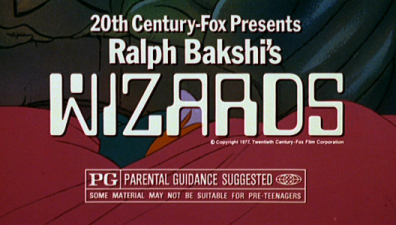
Finally, a big dollop of concept, storyboard and finished production artwork fill out an extensive Stills Gallery, featuring over 150 images. A nice look at the production, this shows that Bakshi’s real talent lies in his comic book background and inspiration: the images here all display more life and vitality that anything moving in the main feature. A nice selection of extras, which really do pack in a great deal of info and explain the rather confused way the film was made.
Case Study:
Recycling the often seen theatrical poster art previously used on the VHS and LaserDisc releases of Wizards, the cover looks deceptively inviting. On the back is better indication of the level of animation to be found in the feature itself, and inside there’s an insert that repeats the poster on one side and lists the chapter index on the other.
Ink And Paint:
Presented for the first time ever on home video in its original 1.85:1 anamorphic widescreen ratio, the image looks very pleasing. Whether it compares to the original theatrical image is hard to say: Bakshi himself declined to oversee the transfer, but he seems pleased with it in the supplemental features. There’s a little gate weave on the print, though it is surprisingly free of speckles, and one thing for sure is that this edition rectifies the awfully cropped CBS/FOX LaserDisc pressing from the mid-80s. Blacks are deep and strong, colors (such as Peace’s bold red outfit) don’t bleed and it is sharp throughout. A very good effort.
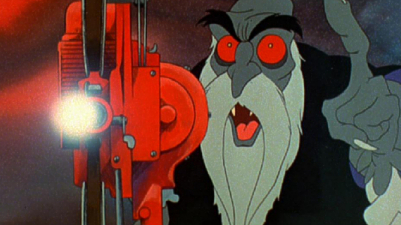
Scratch Tracks:
As with the image, there’s obviously been a little clean up here and there, or at least a return to the film’s original tracks, to produce a sound that represents the film well enough for its age. A Dolby Stereo mix is included as well as original English mono (plus a Spanish dub), though I found the track to be fairly stuck in the mid-range, with heavy treble in some of the louder sequences. The sound comes from the front channels only, and I recommend deactivating the surrounds, since the only thing to come from them is some distortion on louder scenes and peaks. Spanish subtitles are also available.
Final Cut:
If you know Bakshi’s work, or have ever heard of his infamous style, then you’ll have a pretty good idea of what to expect here. While not standing up particularly well to the tests of time, this was the Titan AE/Treasure Planet/Atlantis of its day, and may well interest fans of those pictures. Yes, the film does have some obscure moments shoehorned in, but there are also moments of creativity in the ideas and execution of certain scenes. It is certainly not a film for everyone, and family viewing might be advised after a cautionary parental check, but as an example from one of animation’s “name” directors, this is probably the most accessible of his films and therefore a pretty good place to start. While the film can be slow and plotless at times and the art crude, the DVD represents its intentions well and the bonus features make it worth die hard fans conjuring up a copy, and possibly at least a rent for those curious.
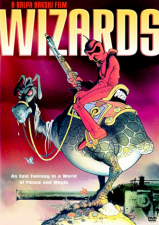 | ||
 [1] [1] |
- [Image]: http://www.amazon.com/Wizards-Ralph-Bakshi/dp/B0001NBMIK?tag2=animatedviews-20
Source URL: https://animatedviews.com/2004/wizards/